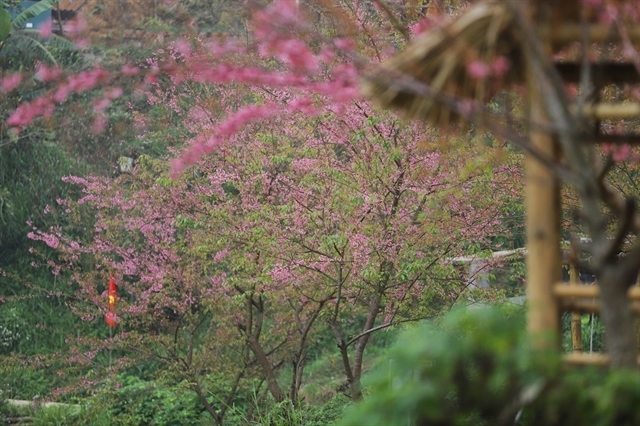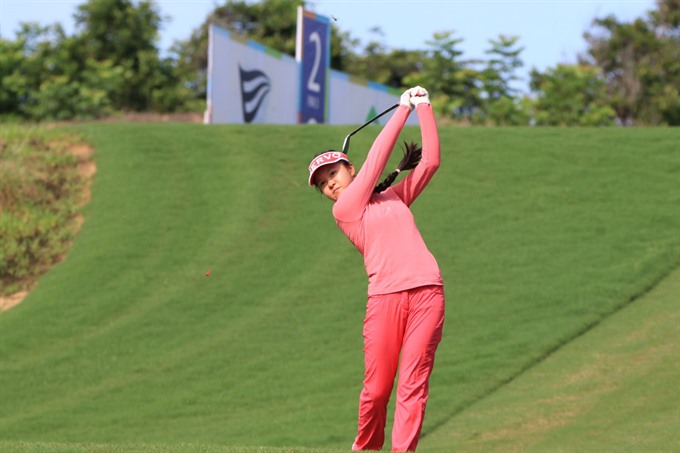 Features
Features

Hanako Kawasaki, together with several other half Vietnamese athletes, will bring diversity to the national team’s demographics at the ongoing South East Asian (SEA) Games 2017.
 |
| Strong swing: Hanako Kawasaki and several other athletes who are half Vietnamese will represent Việt Nam in the South East Asian (SEA) Games 2017 in Kuala Lumpur, Malaysia. Photo courtesy of vga.com.vn |
Hanako Kawasaki, together with several other half Vietnamese athletes, will bring diversity to the national team’s demographics at the ongoing South East Asian (SEA) Games 2017.
The 18-year-old, who is Japanese-Vietnamese, has been playing golf competitively for more than three years. Her biggest achievement came in 2016, when she won the Ladies’ National Amateur Golfer Championship (VLAC 2016) with 145 shots after two days of competition in Thanh Hoá Province.
She also claimed first prizes at the Việt Nam Junior Open and the Saigontourist Golf Tournament in 2017.
Hanako is the second female Vietnamese golfer, in addition to Ngô Bảo Nhi, to be placed on the World Amateur Golf Ranking with a score of 116.84.
Nguyễn Thị Thảo Trang, a representative for the Mercedes Trophy, said that Hanako, though trained locally, had acquired many great skills. “She would get even better if she had greater support,” Trang added.
Hanako is a member of the national golf team that will compete at the SEA Games 2017 in Kuala Lumpur.
“To represent Việt Nam is a big pressure and also an honour for me. I hope to make Việt Nam proud!” Hanako said, adding that hard work had helped secure her place on the team. “I just hope to play the best that I possibly can. I hope I can get some good results for Việt Nam.”
Nguyễn Thị Bảo Quỳnh, Hanako’s mother, said that Hanako took part in intensive training courses so that she could compete well in the regional competition, especially up against talented Thai golfers.
“I owe everything to my mom. She basically did everything for me. If I’m playing a big tournament, she follows me to every hole. If I play bad, she’s there to encourage me,” Hanako said.
Quỳnh said she hopes that her daughter will become a professional player, but golf is a short-term career, especially for women.
“Typically, a female golfer will reach the end of her professional career at 30 years old, some even at 24 or 28 years old,” she said, adding that Hanako should continue her academic studies to secure her future.
“But whenever Việt Nam needs her, Hanako will be ready to contribute!” she said.
Kentaro Kawasaki, Hanako’s elder brother, said that he had played golf alongside his sister for about five years.
“She is much better than me and would probably beat me any day of the week,” he said.
Hanako is in her 12th year at the British International School in HCM City. Though she spends two hours a day on the green, Hanako has managed to keep up her scores in class, according to Quỳnh.
This year, Việt Nam has a number of half Vietnamese athletes taking part in the SEA Games, including basketball players Nguyễn Horace Phúc Tâm and Nguyễn Tú Tuấn Stefan, swimmer Lê Nguyễn Paul, shooter Iwaki Ai, and gymnast Linda Trương.
They are expected to bring an interesting twist to the makeup of the team, and have already notched up successes in several competitions.
Though international athletes are a strong force in the national sports industry, it is difficult to persuade them to stay due to limited financial support.
In addition, since many of them have joined the national team unconventionally, without having to compete in national competitions or obtain a high ranking, conflict has sometimes broken out between international athletes and local ones, who have to go through the whole process to get a spot on the team.
It is important for sporting authorities to come up with a better management system, to not only encourage overseas Vietnamese athletes to stay on the team but also provide fair treatment to Vietnamese athletes at home. VNS




